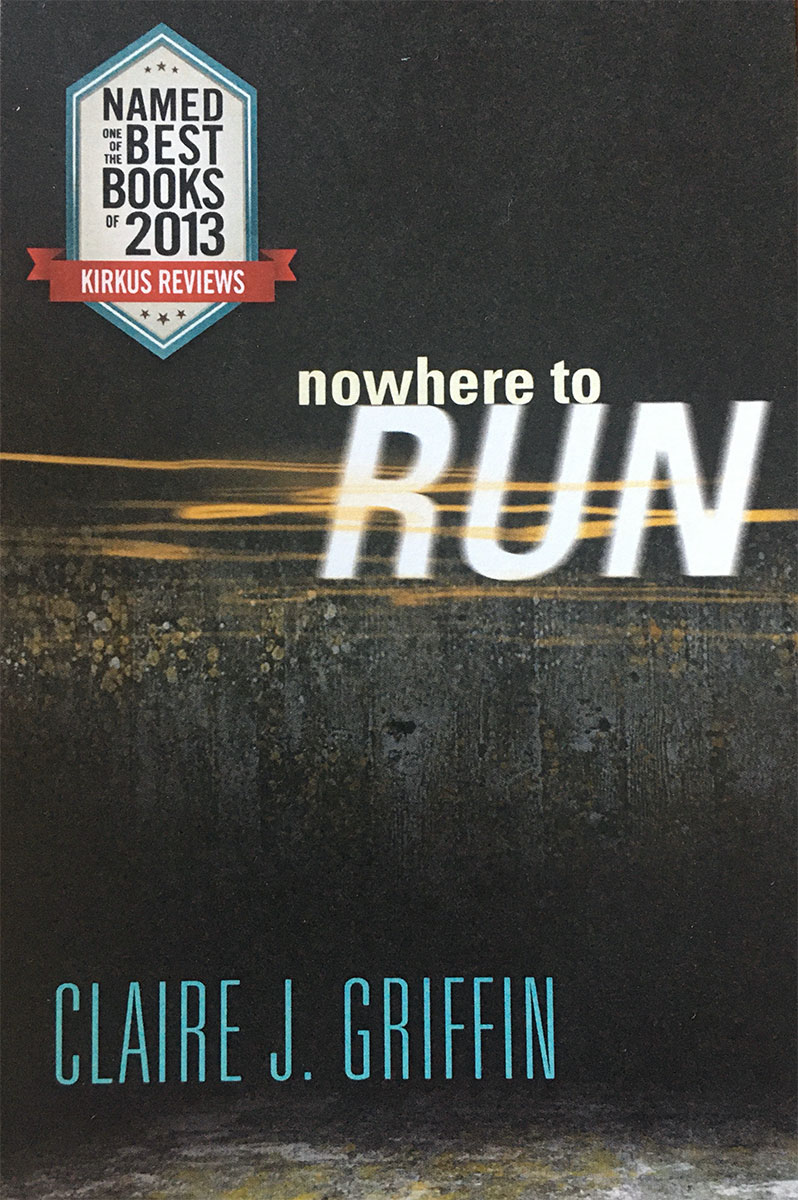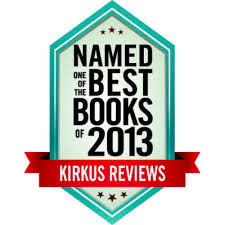Nowhere to Run
Nothing is more important than friendship. But what do you do when a good friend starts down a bad road?

A book will change you, if you let it.
That’s what makes a good book so great. You get to learn from what happens to the characters, without actually having to make their mistakes and live through their pain.
One of the hardest things about being a teen is having to make choices, sometimes without even understanding what the consequences of those choices will turn out to be. That’s what I write about in Nowhere to Run.

“Best Teen Books of 2013”
– Kirkus Reviews
“Best Teen Books for an Adrenaline Rush”
– Kirkus Reviews
“Books to Get Kids Talking”
– School Library Journal
“Quick Picks for Reluctant Readers”
– YALSA
Reviews
“A Kirkus Star!” From the first taut page, it’s clear that this isn’t going to be a happy story… Dialogue, situations, relationships and issues all ring pitch perfectly but ever so discouragingly true…The deliberately ambiguous conclusion will leave engrossed readers weighing Calvin’s options and making their own hard decisions for him…This brief debut packs a serious punch.
Set in Washington, D.C., Griffin’s first novel looks at the price of loyalty, the forces that conspire against good kids from bad neighborhoods, and the frustration of being seen as a stereotype. … [R]eaders will identify with Calvin’s desire to make something of himself.
Griffin’s third-person narrative meticulously delineates street life in one African American neighborhood and creates flesh-and-blood characters with dreams, faults, and uncertainties. Calvin is a likable protagonist, and it’s how he will decide between loyalty to his best friend and his own goals that provides the tension for this strong story.
Nowhere to Run … offers a richly detailed and superbly nuanced portrayal of black kids struggling for dignity and self-definition in an often hostile and cruelly indifferent world. Griffin pays her characters the honor of authentic humanity, which means they are not racial stick-figures meant to prove one point or the other, but flesh-and-blood human beings with complicated lives and complex, even contradictory, motives and actions… Nowhere to Run is compelling reading, not just for young adults, but for adults as well.
Griffin’s slender first novel manages to pack a considerable emotional punch thanks, in large part, to the development of Calvin as a fully dimensional character who invites reader empathy. …[T]he plot is highly readable and fast paced. An excellent book for reluctant readers and for classroom discussion.
Though the novel is short, it has a densely packed plot. Griffin convincingly shows how Calvin is stuck in many ways. Meeting Junior opens him up to thinking about his future, not just in new ways, but thinking about it, period. He constantly tries to make the right choices, but misguided loyalty often steers him wrong. … the message of standing up for yourself and making your own right choices is an important one.
This is a solid, gritty tale of African-American youth that combines sympathy with serious urban edge. The last-second, high-road resolution is somewhat abrupt and not entirely convincing, but it’s the extraordinary tension surrounding a good kid up against bad odds that easily trumps the questionable ending. Slim, taut, and powerful, this is a strong choice for a YA quick pick.
A gritty description of the impoverished and war-torn streets around Washington, DC’s Harry Truman High School helps readers empathize with Calvin’s ambiguous sense of right and wrong. At times, adults such as Coach Albert and Granny Henry are portrayed as caring but helpless to have much influence over the turf wars and allegiances of the young male characters. …. The dialogue-driven, predictable urban drama will appeal to reluctant readers, who will be satisfied with this first novel’s short length and mature situations.
Excerpt
Two in the morning. One block east of Georgia Avenue. It was dangerous for Calvin to be here so late. But he wanted to see Norris, and everybody knew this side of Georgia was his.
Calvin walked down the street. Row houses were strung along both sides. Once in a while he passed one that was boarded up, the yard full of trash and busted lawn chairs. The rest of the houses were shut tight behind security doors made of half-inch steel bars bent into fancy shapes.
People’s windows were mostly dark, but one or two glowed with TV light. Maybe a kid, or somebody with no job to get up for the next morning.
Scraggly trees lined the sidewalk, leaves hanging limp in the heat. The air hummed with the sound of air conditioners going full blast. August in D.C. was hot, even at two a.m.
Calvin walked in the middle of the street so he could be seen. He did not want Norris to think he was sneaking up on him. That wouldn’t be smart.
Calvin wore a white T-shirt, black basketball shorts, and his favorite running shoes. Just in case.
He knew he could outrun Norris if he had to. After all, Calvin was a track star. A sprinter. Norris was an out-of-shape hustler smoking two packs a day. Norris’s boys couldn’t catch Calvin either. Nobody could.
Teachers Discussion Guide
Some of these questions are for class Discussion and others will work well as Writing Questions. I wrote a lot of questions, so you can choose the ones that will work best for your students. Your feedback is welcome.
I plan to update the Discussion Guide periodically. If you send me a question or activity that I use in the guide, I will send you a signed copy of Nowhere to Run.
Comprehension Check:
These quick questions will tell you if students have read the book and understand key events in the story.
- What does Deej say that keeps Norris from beating up Calvin?
- Who does Calvin work for after school?
- Who does Deej live with?
- What animal does Deej compare Junior’s father to? Why?
- What do Calvin and Junior do every day after school?
- How does Deej’s life change after the suspension?
- What happens to Calvin in the Coach store?
- What illegal thing does Deej get Calvin to do?
- Why doesn’t Albert report Calvin to the police?
- What happens when Calvin tries to get back together with Junior?
- What does Deej tell Calvin to do in the final race of his career? Why?
Thematic Questions:
- A big theme in Nowhere to Run is friendship. How would you describe Calvin and Deej’s friendship? Is it an “equal” or “unequal” friendship? Does it change over time?
- There are several scenes where Calvin and Deej talk about serious ideas. Why is it important to have that kind of relationship with somebody?
- Describe Calvin’s relationship with Albert. What does Calvin get from this relationship?
- How important do you think Calvin is to Little Lewis? How does their relationship change throughout the book?
- Describe the home situations of Calvin, Junior and Deej. What are the advantages and disadvantages of each?
- What are the potential problems in a relationship like Calvin’s and Junior’s where they have different
- backgrounds and expectations about life?
- How would you describe Norris? What makes him such a bad guy? What do you think of Deej’s comment in Chapter 4 that he can “handle” Norris?
- What do you think of the ending? Did Calvin win the race? Could/Should the book have ended differently?
- What do you think the future holds for Calvin and Junior?
- What do you think Calvin’s relationship with Albert will be like in the future?
- What are some difficult choices Calvin has to make in the book? Have you ever had to make a decision when the best option wasn’t clear? How did you decide what to do? What were the consequences of that decision?
- Do you know people like the characters in Nowhere to Run? Which character is most like you?
Issue Questions:
- How important is parenting to a child’s or teen’s success? What are some obstacles to good parenting?
- How important is education to a young person’s success? How would you describe yourself as a student?
- Calvin excels at running, and his success is recognized by others. How important is this to how he sees himself? How much value do you think this has in a young person’s life? Do you have a talent?
- At the beginning of the book, there is a quote which says: “Life is lived forward but understood backward.” What do you think that means? Who talks to Calvin about this idea? Where does it happen in the book? Does Calvin find this thought helpful? Do you?
